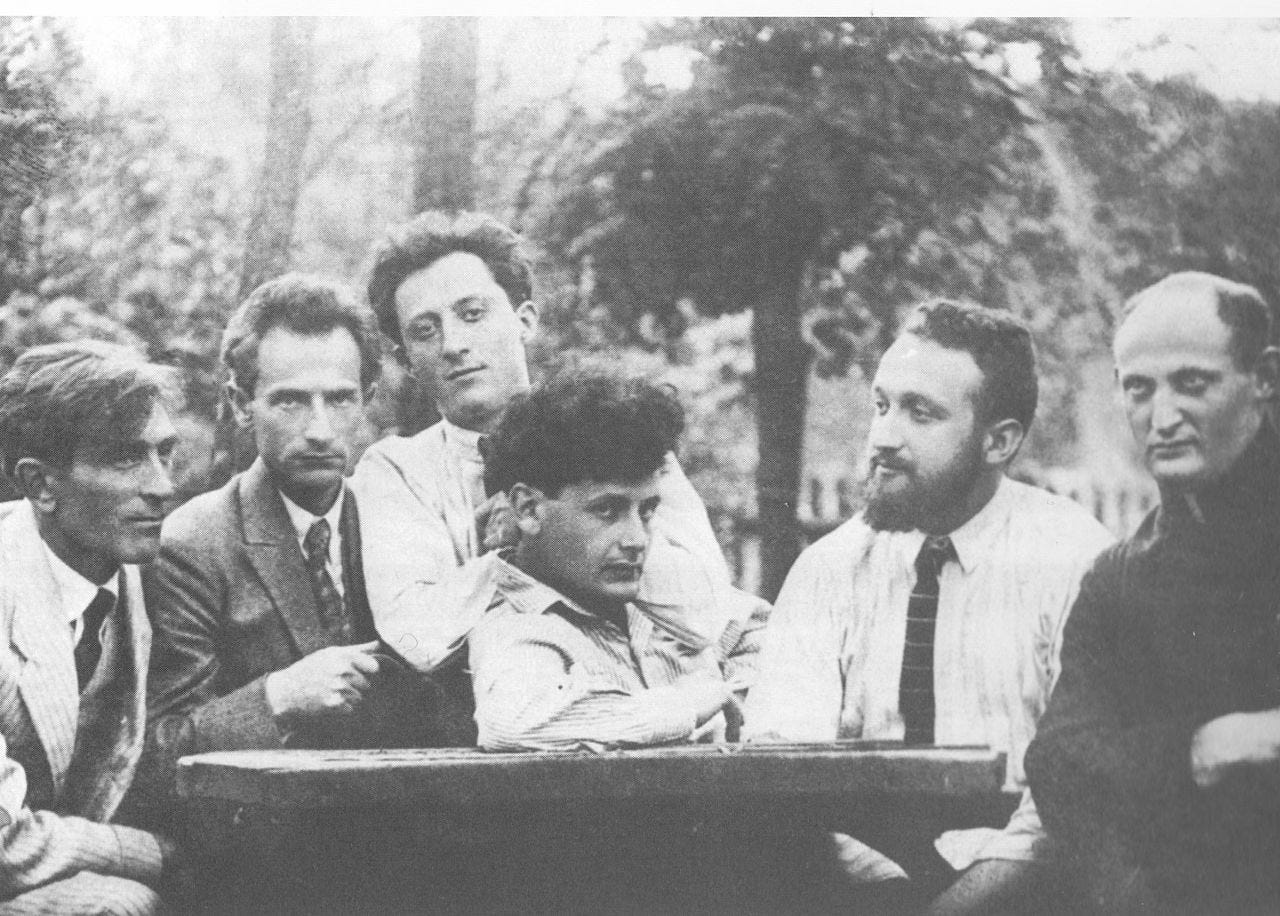Twelve Lines About the Burning Bush
by Melech Ravitch
A shorter selection today, after last week’s double header: Twelve Lines About the Burning Bush, by the great poet and essayist Melech Ravitch.
Melech Ravitch was the pen name of Zkharye-Khone Bergner, born in 1893 in the town of Radymno, on what is now the Polish-Ukrainian border. His biography is too varied and too fascinating to describe here with any justice, but highlights include his move to Warsaw, in 1921, where he helped to form Di Khalyastre, “The Gang,” a group of avant-garde Yiddish artists.
Some central members of Di Khalyastre are pictured below. Ravitch is second from the right, gazing happily into the distance between a vampiric-looking I.J. Singer and an almost too cool Peretz Markish. I love everything about this photograph (which is in the public domain—thanks, wikipedia.)
Alas, as Seth Wolitz writes, “[b]y the end of 1924, the Khalyastre movement had fallen apart as poets denounced each other for their political postures and left Warsaw.”
After the collapse of Di Khalyastre, Ravitch served for a decade as the secretary of the Association of Jewish Writers and Journalists in Warsaw. And from the mid-1930’s onward, he spent years traveling across the world, including stints in Australia, South Africa, and South and Central America, before settling in Montreal. He crossed paths with a young Leonard Cohen, and died there in 1976, having published dozens of books of poetry and prose. He was also an early vegetarian, much to his son’s frustration.
This poem was my first introduction to Ravitch, through Ruth Whitman’s wonderful bilingual anthology of Yiddish poetry.
Twelve Lines About the Burning Bush - Melech Ravitch
So what’ll be the end for us both, God?
You’ll truly let me die like this,
truly never reveal to me the great secret?
Must I first truly turn to dust, gray dust, ashes, black ashes?
And the great secret, which is nearer to me than my shirt, my skin,
will still and always be a secret, though it’s deeper in me than my heart?
For nothing, truly, did I hope by day and wait by night?
And will you stay, until the final moment, rigid and divinely ruthless?
Your face as deaf as silent stone, as blind and obstinate as flint?
It isn’t meaningless that one among your thousand names is thorn,
you thorn of my spirit and flesh and bone--
puncturing, and I can’t rip you out--burning, and I can’t put you out--
an unforgettable instant, incomprehensible eternity.
I love this poem, and thought that—given its stated subject of the burning bush—it would be fun to send out during Passover. But how exactly is this a poem about the burning bush?
It’s worth noting here that the Hebrew word for the bush that Moses finds aflame in the desert, סנה, is thought by many scholars and commentators to refer specifically to a thorn bush or brambles. The standard lexicon of Biblical Hebrew even speculates that the burning bush is perhaps a blackberry bush, for philological reasons that are beyond me. So to anyone well-versed in Hebrew, which included Ravitch and many of his original readers, it would have been intuitive, or at least reasonable, to associate “burning bush” with “thorn.”
I’m fascinated, though, by the relationship with God which this poem describes. For Ravitch here God is not an all-powerful creator, not a benevolent redeemer, but a silent guardian of “the great secret,” which is at once piercingly intimate and completely inaccessible to the poet.
So what is the great secret? Is it truth, ultimate meaning, the actuality of God? All of the above, I think, and more. This poem reminds me of Kafka’s “Before the Law,” in its suggestion that a truth really does exist, a truth the grasping of which is both necessary for human life and impossible. We know that the truth, the meaning of existence, the great secret, is real, because we can feel it within us, even as we know that it will never reveal itself.
This is a poem about the burning bush, then, because the burning bush is an archetypal instance of absolute, individualized revelation. For Moses, this revelation offers a moral calling: he must return to Egypt, to free the enslaved Israelites. But for Melech Ravitch--and for Kafka, and for many of us, perhaps--the revelation of the burning bush provides no calling, no vocation, no lasting truth by which to live.
Well, maybe that’s not true. Maybe the calling Ravitch finds in the burning bush’s revelation is a demand to grapple with the revelation’s distance and incomprehensibility. To look for the great secret even as he knows it will never be made clear, and to know that the great secret will never be made clear even as he understands that he must look for it forever.
Oh, and: one lovely, somewhat unexpected thing about these last two newsletters has been the conversation they’ve sparked, so if you have thoughts or reactions to this poem or to anything I’ve written here, please feel free to comment or to reply individually by email. This has been really gratifying, and I’m grateful to those of you who have responded!




I'm in love with that opening line and specifically the phrasing of it being the end for "us both/אונדז ביידן" It plays to that intimacy you're describing and I'm obsessed with the ways you can read that implication. The existence of God here tied directly to the existence of the individual reminds me of the idea that the universe is created with every birth and destroyed with every death. Was this written towards the end of Ravitch's life?